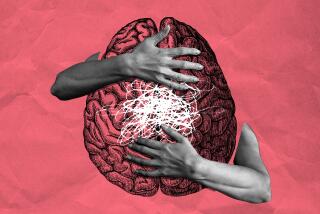Hypnosis: You are getting sleepy ... and calm, and thin, and ...

- Share via
Ever wonder why some people, even under adverse circumstances, set goals and achieve them effortlessly? Some of them, undoubtedly, are hard-wired to succeed. They just set themselves in a direction and their mind handles the rest.
But that ability is atypical; most of us, at one time or another, are daunted by illness or other mental or physical challenges. That’s where hypnosis can come in. Experts in a variety of fields say that patients become highly focused and open to suggestions when they are in a trance-like state.
Hypnosis is often associated with psychotherapy but is gaining popularity in more mainstream arenas. Athletes use it to improve their game. Dieters and chemotherapy patients have found it to be useful.
Here we take a look at six ways hypnosis is used in medical and nutritional communities:
Radiation and chemotherapy
Psychologist Charlene Williams, clinical programs director of the Mind-Body Medicine Group in the division of head and neck surgery at UCLA, uses hypnosis with patients diagnosed with cancer. Patients undergoing chemotherapy and radiation may opt for hypnosis recordings to help them endure their grueling treatments. “A lot of patients going through chemo or radiation feel as though they are at death’s door,” Williams says.
How it works: Williams references cooling imagery — chilled lemonade, a mountain stream, cold weather — when she creates hypnosis recordings for patients. “Sometimes patients come up with their own imagery,” she says and adds that cooling imagery helped one patient control airway inflammation.
The technique worked so well that another patient shivered during treatment. “We had him imagine putting snow all around his neck. So the coolness just permeated down each level and layer of the skin.”
Some of these same techniques were used with second- and third-degree burn patients in the emergency room, Williams says. Those patients had less redness and were better able to manage their pain.
Try this: “Learn to become absorbed in the imagery,” Williams says, while disengaging from your barrage of negative thoughts.
Stress and anxiety relief
Feeling anxious or uneasy before giving a speech to 50 people is normal — it is estimated that 40 million people in the U.S. are affected by anxiety. But when these feelings turn into frequent uneasiness and sweaty-palms nervousness that affects your job and quality of life, you might consider hypnosis.
How it works: Sometimes it feels scary to acknowledge uncomfortable feelings, but hypnosis can help alleviate the fears. In a relaxed state, it’s easier to “separate your physical from your mental experience,” says Dr. David Spiegel, who is the Jack, Samuel and Lulu Willson professor in medicine at Stanford University.
When we experience strong emotions like anger, we don’t always think clearly, Spiegel says. By regularly using hypnosis to enter a relaxed mental space, we essentially train ourselves to remain calm.
Try this: The next time you notice mounting anxiety or stress, solve it with an imaginary screen. “On the left side, imagine something that’s troubling you, on the right, imagine one thing [you] can do about it,” Spiegel says. “It’s a way of thinking through things [that are] stressing you out without psychological and physical tension.”
Dieting
Maybe the idea of cake (with lots of frosting) rattles your brain from morning to night. Want hypnosis to change that? Start noticing those thoughts and refocus them, says Colin Christopher, a Canadian certified clinical hypnotherapist and the author of “Success Through Manipulation: Subconscious Reactions That Will Make or Break You.”
“The overweight person is usually focused on their results [on the scale]. The fit, healthy person thinks more about sports, activities and eating healthy foods.”
How it works: During hypnosis, the subconscious mind opens up more easily, Christopher says. Some refer to this as the moment we suspend belief about our perceptions. “The subconscious mind doesn’t know the difference between what’s real and imagined,” so go ahead and start programming the mind to do what you want it to. Think about smaller food portions or clothes that fit loosely.
Try this: Visualize eating a bowl of dark red cherries or savory vegetarian chili. See yourself preparing a fresh salad with romaine lettuce, carrot shreds and tomatoes. “Imagine whatever food you’re eating, that every time you swallow you feel satisfied,” Christopher says.
Irritable bowel syndrome relief
Irritable bowel syndrome affects the lower gastrointestinal tract and typically brings on diarrhea, constipation, bloating and gas — often with little warning. But research shows that hypnosis, when combined with psychotherapy, can ease symptoms.
“With IBS, up to 80% and higher experience significant relief,” says Williams, referring to research from William Whitehead, a professor at the University of North Carolina at Chapel Hill. “Once they have relief, five years later, the majority still have relief.”
How it works: Patients “learn to do self-hypnosis, so if they feel an attack coming on, they learn to regulate themselves in the moment,” Williams says. “These are tools you always have and you develop confidence in your ability to stop flare-ups.”
Try this: People with irritable bowel syndrome often experience fear of embarrassing situations or lack of control, says Williams. To ease fears, patients are instructed to place one hand on the stomach and repeat one of three words — “warm,” “calm,” “safe” — per deep breath.
Sports improvement
Athletes use hypnosis to improve their golf swing, jump shot or chances at Olympic gold. When Jim Taylor, a psychologist and partner in a Bay Area corporate consulting firm, talks to athletes, he tries to instill the idea that the mind is a powerful tool and it can help them achieve their goals when they know how to use it.
How it works: Taylor talks about how motivation, stress, focus, confidence and emotions affect overall performance on game day. He helps athletes identify which area needs improvement. Typically, athletes struggle in a couple of areas, he says, adding, “People who lack confidence tend to experience more stress and negative emotions.”
Taylor uses positive self-talk strategies to help patients overcome negative thoughts that end up costing them the winning shot. An athlete might say, “I’m terrible, I stink” after a losing streak. Instead, Taylor suggests replacement thoughts like, “OK, I struggled in that performance and I know now what I need to do to improve.”
He says people have “bad thought habits.” But with practice, you can “retrain habits,” which helps you think more positively.
Try this: Close your eyes. See yourself on game day. Imagine delivering a perfect tennis serve or scoring points on the basketball court. It’s important to see yourself staying relaxed and confident during games, he says, because both will help you win.
Sexual dysfunction
Stress, Christopher says, has a “carry-over into the bedroom.” So if you suffer from sexual dysfunction but have not been diagnosed with specific medical problems, hypnosis might be useful.
How it works: With relaxation techniques and guided imagery, Christopher helps clients minimize stress so they are more attuned to their partner’s needs and their own.
Sometimes, more complex matters — “negative emotions” — are problematic. “So it’s about going back and resolving those emotions,” Christopher says.
Try this: Get relaxed. Sit or lie down in a quiet place. Visualize yourself descending a staircase — 10 steps. Each step feels more relaxing, says Christopher. Prepare to destroy negative thoughts.
“Then I might get them to collect all the negative emotions and thoughts, put them into a box and let them throw it into the sun,” he adds.
When they reach a relaxed state, “I ask them to touch their fingers together. When you’re feeling stressed [at a future point], touch your fingers, and it triggers the same physical relaxation in your body.”






